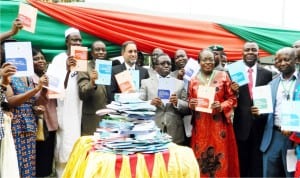Business
Consumers Lament Food Prices In PH

Minister of Health, Prof. Isaac Adewole (middle); Acting Director General, National Agency for Food and Drug Administration Control (Nafdac), Mrs Yetunde Oni (3rd right) and World Health Organisation Country representative, Dr Rui Vaz, at the unveiling of the Nafdac Good Manufacturing Practice Guidelines for Pharmaceutical Products 2016 in Abuja on Tuesday last week.
A cross section of con
sumers of food stuff in Port Harcourt, the Rivers State capital have been lamenting over the price increase on such items, saying the situation is drastically affecting their livelihood.
The consumers, who barred their mind in an interview with The Tide in Port Harcourt at the weekend, said the increase in prices of food stuff was not unconnected with the lingering fuel scarcity across the country.
According to them, the after – effect of the fuel scarcity is seriously affecting them as transporters hike fares while transporting their goods and wares.
They said that government should address the issue of fuel scarcity in order to save the consumers from these untold hardship.
Sister Gloria Alao said the effect of the fuel scarcity is weighing seriously on the consumers as they expend more money to purchase their daily needs.
Alao opined that they are paying for what they did not bargain for as there is 100 per cent increase in most food stuff they bought in the market and elsewhere.
In her reaction, Mrs Abigail Ufoma Jonah, said the sudden increase in prices of food stuffs in the market is really a source of concern to many families as some could not afford it due to the hash economy.
According to her, if government solves the issue of fuel scarcity, the prices of food stuff would drastically reduce as those traders going to the interior to get the stuffs would now pay less to transport them.
Stephen Ibifaa also lamented that food stuff had gone high due to the fuel scarcity and the bitting economy, and called for a lasting solution to save the common people in the society.
Alapakabia Inumama, in her reaction said the rising prices of food stuffs had been a great concern to the masses who are at the receiving end especially the consumers, and appealed for restoration of normalcy in all sectors of the economy.
Transport
Automated Points Concession : FAAN Workers Gave 72hrs To Revise Decisions In PH

Transport
FAAN Announces Pick-Up Points for Go-Cashless Cards

Business
Fidelity Bank To Empower Women With Sustainable Entrepreneurship Skills, HAP2.0
-

 Politics3 days ago
Politics3 days agoSenate Urges Tinubu To Sack CAC Boss
-

 News3 days ago
News3 days agoAmend Constitution To Accommodate State Police, Tinubu Tells Senators
-

 News3 days ago
News3 days agoDisu Takes Over As New IGP …Declares Total War On Corruption, Impunity
-
Business4 days ago
Crisis Response: EU-project Delivers New Vet. Clinic To Katsina Govt.
-
Business4 days ago
President Tinubu Extends Raw Shea Nuts Export Ban To 2027
-
Business4 days ago
President Tinubu Approves Extension Ban On Raw Shea Nut Export
-
Business4 days ago
Fidelity Bank To Empower Women With Sustainable Entrepreneurship Skills, HAP2.0
-
Sports4 days ago
NDG: Rivers Coach Appeal To NDDC In Talent Discovery

